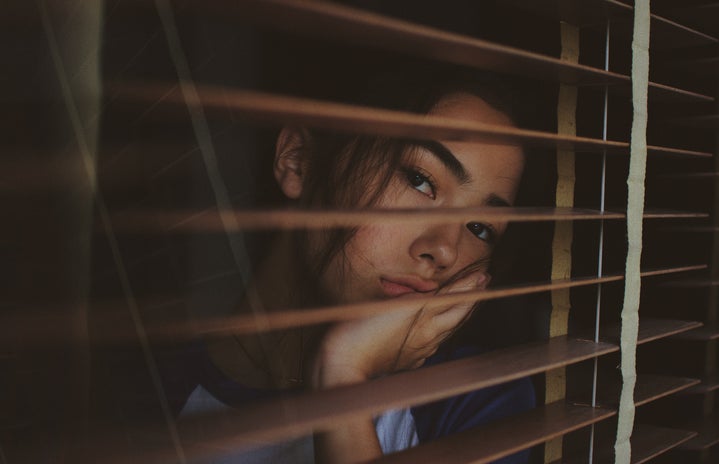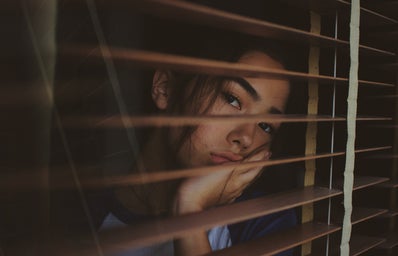Trigger Warning: There are mentions of suicide, suicide attempts, depression, anorexia/eating disorders, and of mental illness.
My depression first started after seventh grade when my crush and close friend at the time moved away. I didn’t just miss him for the next year or so like the rest of my friends. I missed him every night for the next three years. I knew it was depression because it was unlike anything I’d ever felt before. I cried every night, and pretending like I didn’t would be the theme of my high school years.
My depression was never the mistake. The real mistake was keeping it all to myself, wearing a smile that was no longer true, and thinking no one would understand. Because it ended up being two things that saved my life: my notebook, and people who did understand me.
During my freshman year of high school, my friends reported me for my disordered eating. Lying about my eating, my excessive exercising, and my self-starvation were no longer secrets. I’m not going to lie. I was mad at my friends at first. But today I thank them every day for what they did. They took me from precontemplation, to believing nothing I was doing to my body was wrong, to contemplation, where I finally started wanting to change. One of my favorite things about the cycle of change and motivational learning is you meet people where they’re at.
Of course my recovery wasn’t linear. I slipped up. Food triggered me. It still does and always will. But I got through it because I knew people had my back. Sometimes I still struggle, but every time I have the temptation to run off my dessert or lie and say I already ate at a party because I’m terrified to eat in front of people, I fight it.
I’ve studied the appearance ideals and cultural expectations of beauty and I’ve listened to others’ stories. By knowing that the ideals the media and society have pressured me to obtain – knowing it’s impossible and has more costs than benefits – has diminished my desire to look any different. I was an overweight child, got bullied, and then got complimented when I lost the weight. I got addicted to restriction, falsely thinking it would erase my childhood trauma. But then therapy taught me how to acknowledge the bullying I went through and the negative associations I had with eating, while being able to move on at the same time.
I give presentations now and lead peer groups for those in recovery with eating disorders. Recovery isn’t linear, but I promise you, your scatterplot has meaning. Every dot shows effort, it shows progress.
I was 15 the first time I tried to kill myself. I was 16 the second time, and 17 the third. Sophomore year, junior year, and senior year of high school. I’m not proud of it, and part of me, before deciding to publish this, wondered if I’d be making a mistake, wondered if people would look at me differently. But if one person going through what I went through reads this and sees that they aren’t alone, if they see someone openly talking about what society tells them not to, my hope is that I can help that person. And then to me it is very worth it. Helping just one person is always worth it.
I don’t regret the attempts. I don’t regret them because if they never happened, I wouldn’t have ever told anyone what was going through my head. I got help, I received therapy, I spent time with myself, and I did a lot of writing about it. The first attempt was because of an A-minus. Yes, an A-minus. I had so much perfectionism. I’ve since learned how to see myself as someone who didn’t have to be perfect.
I had a friend in high school help me through it with faith and kindness. Over time, I started to want better for myself. And when that happened, in the words of my best friend, I did a 180. I literally felt like a new person. I added a psychology major, and I started writing books about mental health. I became the one on the other side ready to help others. Ready to help people in the same places I was years ago.
I haven’t struggled with strong suicidal ideation since high school. It’s been over four years. I’m content with my life. I get joy from helping others off the page and on the page. I want to be the proof that you can get through anything. I still have bad days, but I get help and I’ve learned how to cope better.
Like I said, it’s my notebook and the people who cared about me who saved me. And I saved me too.
You can 100% save you, and you don’t have to do it alone.
I would love to share some local mental health resources at Michigan State University. If you struggle with body image and would like to learn more about the media’s impact, please check out the MSU Peer Body Project run by Karen Giles-Smith; it’s where I learned everything. SEBA is another body positive group! The Spartan Support Network is also a peer-led organization where small groups get together and talk about mental health or just about their day-to-day life. Presentations are given on mental health and there are speakers as well. Also feel free to call 988 which is the 24/7 suicide and crisis lifeline.


